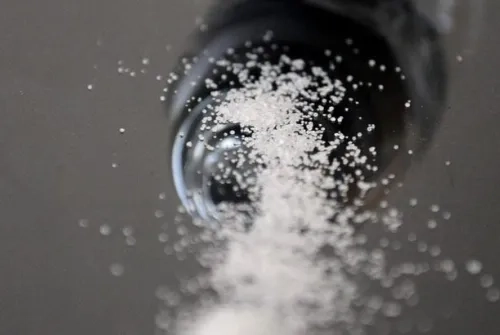Alo Yeditepe
Alo Yeditepe
If You Consume More Than 5 grams of Salt...
The specialists are quite strict about salt consumption as well as their uncompromising attitude to sugar. Taking into account the research conducted, doctors emphasize that three times more salt is consumed in Turkey than usual and say, "Remove salt from your life." So why is salt such a threat to health, how does it cause changes in your body? Here's what you need to know about salt...
It is known that there is a strong relationship between hypertension, which is one of the common diseases in our country, and salt consumption. Drawing attention to the fact that according to the research of the Turkish Society of Hypertension and Kidney Diseases, three times more salt is consumed in Turkey than usual, Yeditepe University Hospital Internal Diseases Department Nephrology Specialist Prof. Dr. Gülçin Kantarcı says that along with smoking, salt consumption also constitutes a significant issue in terms of hypertension. Prof. Dr. Gülçin Kantarcı answered our questions on the subject.
First, in what functions does salt play a role in our body?
Table salt, which we have been using for centuries to increase the storage time of food, contains sodium and chlorine. These elements are used by our cells to perform various functions. Sodium is so important to keep the volume of fluid in the body balanced due to its water-retaining property. It is also an element needed to ensure transmission in our nerve cells.
Then, what is the amount of salt our body needs to maintain the sodium balance you have mentioned?
Under normal conditions, the natural salt content of foods meets our needs even if we do not add salt to foods. In some cases, when there is salt loss from the kidneys through urine, the salt content of foods may fall short, but apart from that, it is sufficient to consume foods in their natural form without adding salt. There is no need to add extra salt. We often add salt to meals after cooking to have them suit our taste. We should abandon this behavior.
What is the relationship between salt consumption and hypertension?
There is a strong relationship between salt intake and hypertension. As salt consumption increases, the risk of hypertension increases. This is proven by the fact that hypertension is more common in societies consuming excessive salt. For example, according to a study conducted by the Turkish Hypertension and Kidney Diseases Association, three times more salt is consumed in Turkey than usual. Our country's average daily salt consumption is 18 grams, which is quite a high amount.
How is the situation in the West?
The average daily salt consumption in Western societies is 9-12 grams. In our case, on the other hand, the amount of salt taken with bread alone is 7.2 grams on average per day. The difference is huge.
At what stage should we keep our relationship with salt in case of hypertension?
The salt restriction will be helpful at all hypertension levels, as it will reduce blood pressure. The restriction of salt can normalize blood pressure in mild hypertension. In severe hypertension, on the other hand, it may help reduce the amount of medication used. The daily amount of salt allowed is 5-6 grams to prevent and treat hypertension.
What should we pay the most attention to in nutrition in terms of salt consumption?
There is much more salt in tomato paste, potato chips, instant soup, biscuits, cakes, sausages, pickles, olives, instant sauces, dried fruits, and nuts, canned foods, as well as processed and frozen foods than we need. All prepared foods are a hidden source of salt, although they do not leave the taste of salt on the palate.
Do genetic factors play a role in the relationship between salt and hypertension?
In some people, high blood pressure is more susceptible to salt intake. This trait may be passed down through genes from either the mother or father. So some people may be predisposed to hypertension due to their innate characteristics. On the other hand, due to several genetic differences in the salt retention mechanism of the kidneys, some individuals may develop earlier and more severe hypertension if environmental factors also support this. Such people should be more careful about using salt than others.
What else should hypertension patients pay attention to besides salt consumption?
Excessive weight is a significant risk factor for hypertension. Therefore, it is important to prefer low-fat foods and do sports. In addition, smoking is also a risk factor for hypertension and must be avoided.
Finally, what would you recommend to hypertension patients?
Patients should have their blood pressure measured regularly and take medication under the supervision of a doctor as needed.
About
Faculty and Year of Graduation:
Uludag University Faculty of Medicine 1984-1990
”
See Also
- What is Hypoglycemia?
- Common Misconceptions About Kidney Transplantation
- Kidney Diseases and Treatment Methods
- 10 Questions About Kidney Transplantation
- How Should the Daily Salt Consumption Amount Be?
- Misconceptions About Hypertension
- Chronic Kidney Disease and Treatment Methods
- What is Hypertension?
- Things Wondered About Kidney Transplantation and Organ Donation
- The Frequency of Hepatitis Seen in Dialysis Patients Is Decreasing
- 12-Year-Old Tuğba Nur Survived with Transplant
- Excess Protein Does Not Increase Muscle Mass, and It Impairs the Kidneys
- AV FISTULA Should Be Done At The Right Time For Hemodialysis Patients
- Pay Attention to Kidneys in Pregnancy!
- He Held On To Life with His Brother's Kidney
- Recommendations to Strengthen the Immune System
- Kidney Failure Caused by Ear Obstruction
- There is Still a Lot of Misconception About Organ Donation
- He Lost 20 Kilograms in 40 Days for His Wife
- One Out of Every Seven People Has Kidney Disease
- How Should Kidney Patients Be Protected From COVID-19 Coronavirus?
- What is Propolis? How to Use Propolis?
- Improper Nutrition Invites Kidney Failure
- Important Warning from the Expert: “Not Adding Salt to Meals Alone Is Not Enough”
- Tissue Harmony Is Also Important for Success in Kidney Transplant
- Phytotherapy and Immune System
- Hereditary Kidney Diseases Are Underrecognized!
Alo Yeditepe





